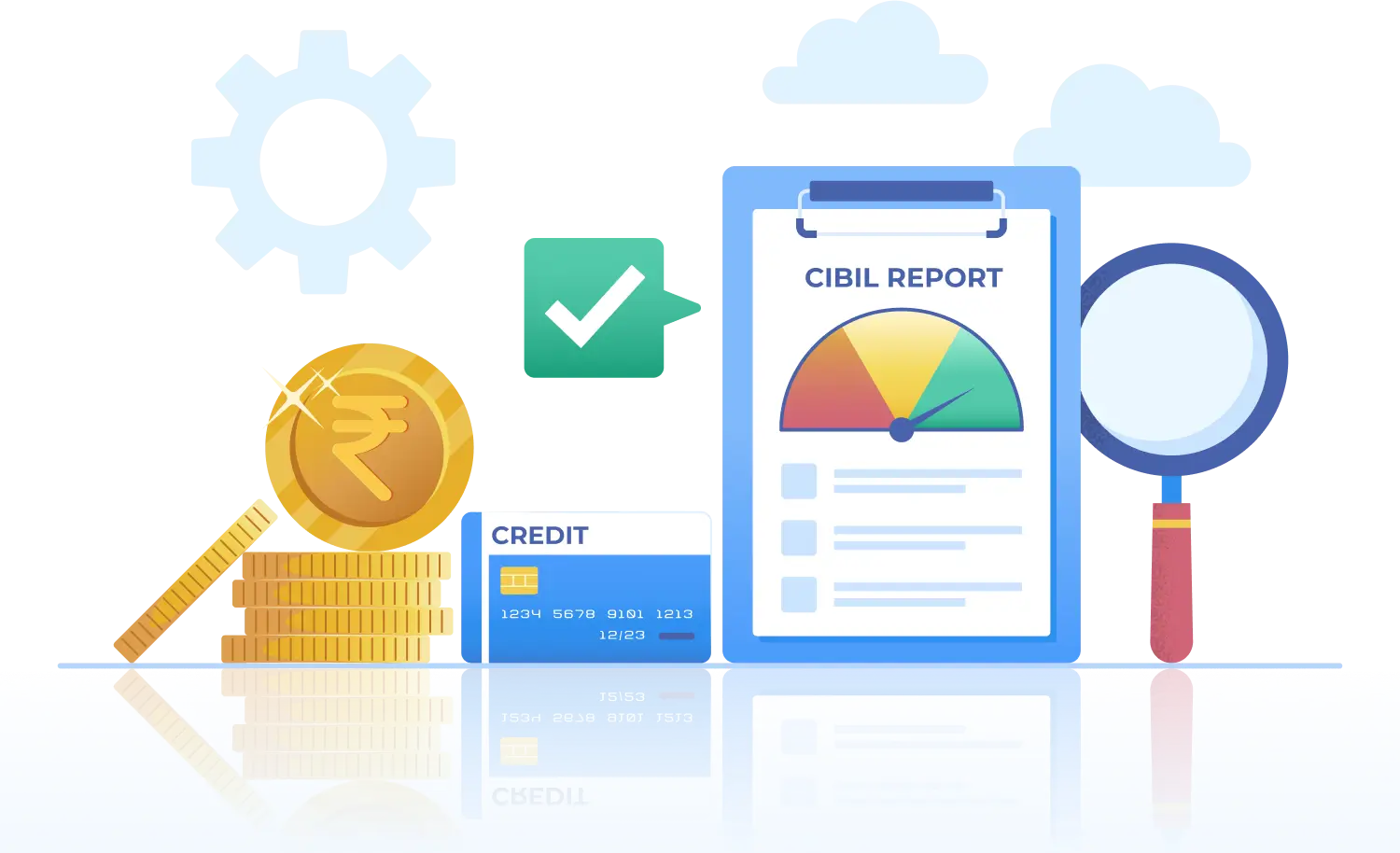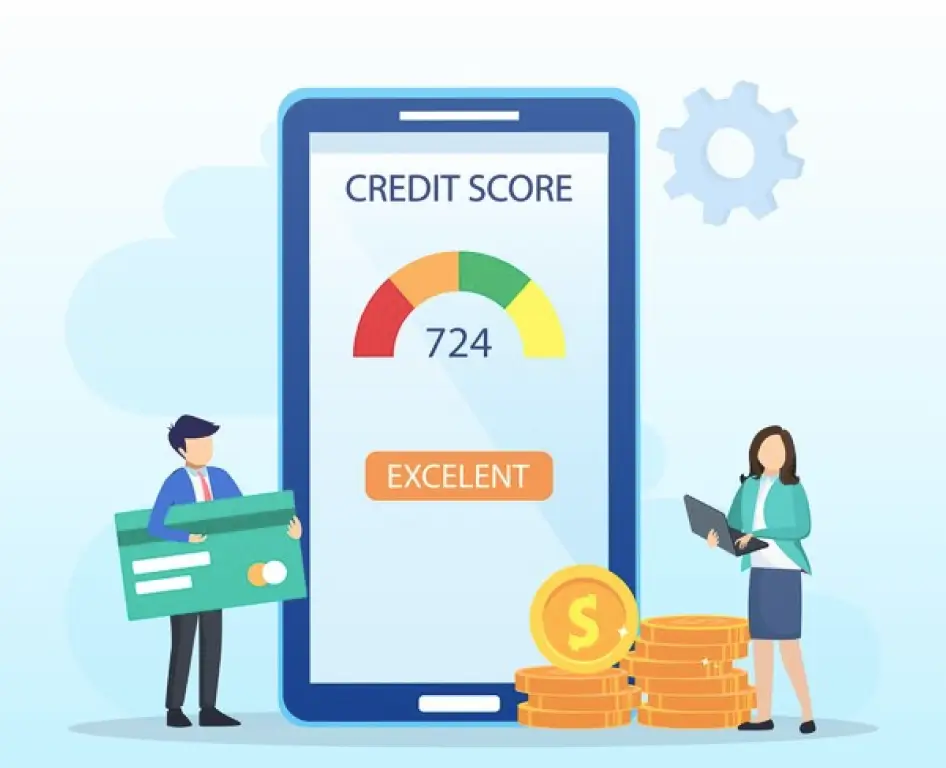Sign in
India's Leading Loan Distribution
Company Offering Instant Free
CIBIL Score Check Online

Instantly check your CIBIL score with Ruloans, India’s leading loan distribution company. Enjoy a seamless experience as you access your credit score for free and get a detailed credit report. Whether you’re exploring loans, insurance, or tracking your financial health, Ruloans is your trusted partner on the path to financial stability and success.
What is the CIBIL Score?
A CIBIL score represents your creditworthiness, calculated from your credit history and financial behavior. Ranging from 300 to 900, a higher CIBIL score signals better credit health. Financial institutions use this score to assess lending risk. A good CIBIL score can unlock favorable interest rates and loan terms, while a lower score may result in higher interest or loan rejections.

Importance of Checking Your CIBIL Score Online
Regularly checking your CIBIL score allows you to monitor your financial standing, catch any inaccuracies, and take steps to improve your score if needed. With convenient CIBIL score check online options, staying informed is simpler than ever you can get your CIBIL score online with just a few clicks.
CIBIL Score Range and What it Means
In India, the CIBIL Score ranges from 300-900 and is further divided into several categories:
CIBIL Score
Creditworthiness
550 and below
Bad
You have a low chance of getting a loan, especially for a high amount. Discipline your finances before applying for a loan.
550 - 649
Poor
Delayed loan payments reflect the risk of not paying a loan on time. Improve your score by paying previous loans before applying for new ones.
650 - 699
Average
Loan approval is possible but with higher interest rates and fewer benefits. Improve your score by making timely payments.
700 - 749
Good
With a good CIBIL Score, your chances of loan approval increase. Further, improve your score to get better interest rates.
750 - 900
Excellent
This score indicates timely payments. Borrowers with super CIBIL Scores are considered low-risk and can get high loan amounts at attractive interest rates and minimal paperwork.
How to Check Your CIBIL Score for Free at Ruloans: Simple Steps for an Instant CIBIL Report Online
Check Your CIBIL for Free with Ruloans. Follow these simple steps:
Go to Check CIBIL Score : Visit Ruloans website and go to ‘Check CIBIL Score.
Sign in with Mobile Number : Enter your mobile number to sign in.
Fill out the Form : Enter your details, including your PAN number.
Get Your Score : View your CIBIL score instantly for free.
To monitor your credit health, you can check CIBIL score online for free with Ruloans.com. With our Free CIBIL Score option, you can view your CIBIL report free, providing a comprehensive look at your credit profile. For a smooth experience, try our CIBIL check online and explore the advantages of online CIBIL score options.
Benefits of a High CIBIL Score: Why Regular Online CIBIL Score Checks Are Essential

Easy Loan Approvals
Higher chances of loan approvals from banks and financial institutions.

Better Interest Rates
Access to loans at more competitive interest rates.

Higher Credit Limits
Eligibility for higher credit limits on credit cards.

Faster Loan Processing
Quicker processing of your loan applications.

How Ruloans Helps You Manage Your CIBIL Score
Managing your CIBIL score is effortless with Ruloans by your side. Offering free CIBIL Score Checks and expert advice, Ruloans helps you monitor, manage, and improve your credit score effectively. Whether you're seeking loan products, mutual funds, or insurance, our extensive network of 275+ private banks, PSU banks, NBFCs, and financial companies ensures you get the best options tailored to your needs. With Ruloans, you not only access financial solutions but also gain the tools to build a stronger credit profile. Empower your financial future with Ruloans the partner you can trust for smarter financial decisions!

Tips to Improve Your CIBIL Score: Expert Advice and Free Online CIBIL Score Check by PAN Card
To boost your CIBIL Score, Consider the following strategies:

Pay On Time
Pay your bills on time. Late payments can hurt your CIBIL Score. Set up auto payments or reminders for due dates.

Manage Credit Utilisation
Use less than 30% of your total Credit across all cards. Low balances compared to your credit limit show lenders you manage your Credit well.

Diversify Credit
It’s good to have a mix of different types of credit accounts, like Revolving Credit (credit cards) and Installment loans (auto loans, personal loans, mortgages).

Use Secured Credit Cards
If you are building Credit from scratch or repairing Bad Credit a secured credit card can be a good option. The credit limit of these cards is determined by the amount of cash you deposit. Pay the balance monthly to establish a good payment history.

Keep Old Accounts
Age of credit history matters. Older accounts contribute to longer credit history and better score. Think twice before closing old accounts which can shorten your credit history and increase your utilisation ratio.

Monitor CIBIL Score
Monitor your Cibil Score and report through credit bureaus or third-party apps. By monitoring your score you can know the impact of your financial activities on your score and prevent identity theft.

Check Credit Reports
Check your credit reports regularly for errors or fraud. Dispute with the credit bureau and lender if you find errors.

Seek Professional Help
If you need more time to improve your Credit, consider consulting a credit counselling service. In addition to providing personalised advice, they can set up a debt management plan for you.

Apply for Credit Sparingly
Every time you apply for Credit a hard inquiry is made which can temporarily lower your score. Apply for new Credit sparingly and as needed to avoid multiple hard inquiries in a short span.
FAQs
View Less
A CIBIL score is a three-digit number that represents your creditworthiness based on your borrowing and repayment history.
It typically ranges from 300 to 900 and is one of the most important credit scores for loans.
Lenders check your CIBIL score before approving any loan or credit card to assess whether you are a low-risk borrower. A higher CIBIL score increases your chances of getting loans at better interest rates.
The maximum CIBIL score is 900, which represents the highest level of creditworthiness.
- Achieving this score is rare and requires consistent financial discipline, such as timely repayment of EMIs and credit card bills, maintaining a low credit utilization ratio (ideally below 10%), avoiding frequent credit inquiries, and building a long and diverse credit history.
- A score of 750 and above is generally considered the best credit score for loans, as it increases your chances of loan approval with favorable interest rates and terms. Regularly reviewing your credit report for errors is also crucial to maintaining a strong credit score.
If you’re wondering how CIBIL score is calculated, it is based on several important credit score factors.
- These include your repayment history (whether you pay EMIs and credit card bills on time), credit utilization ratio (how much of your available credit you use), length of credit history, types of credit (secured and unsecured), and the number of recent loan or credit card inquiries.
- Among these, repayment history and credit utilization carry the most weight. By managing these credit score factors responsibly, you can maintain a strong CIBIL score and improve your chances of getting loans and credit cards approved easily.
Yes, clearing your outstanding dues and completing a loan closure can improve CIBIL score over time. When you repay your loan in full, it shows lenders that you are financially responsible, which positively impacts your credit profile. However, the loan closure effect on credit score may take a few weeks to reflect in your CIBIL report as it depends on when the lender updates the credit bureau.
Yes, credit card late payment CIBIL score impact is significant.
Even a single missed or delayed payment can negatively affect your score, as repayment history is one of the most crucial factors in CIBIL’s calculation.
Consistently paying EMIs and credit card bills after the due date lowers your score, reduces your creditworthiness, and makes it harder to qualify for loans or new credit cards in the future. To protect your score, always pay your bills on time.
If you’re wondering how to improve CIBIL score, the key lies in disciplined financial management. Always pay your EMIs and credit card bills on or before the due date, and try to keep your credit utilization ratio below 30%. Avoid applying for multiple loans or credit cards within a short period, as too many inquiries can lower your score.
Maintaining a balanced mix of secured and unsecured credit also plays an important role. By following these practices consistently, you can gradually boost credit score and increase your chances of getting loans approved with better interest rates and favorable terms
No, checking your own CIBIL score does not negatively affect it. In fact, you can check free CIBIL score online anytime to stay updated on your credit health.
These are considered “soft inquiries” and do not lower your score, unlike lender-initiated “hard inquiries.” Regular monitoring enables you to identify errors and take corrective steps promptly.
You can do a free CIBIL score check online through trusted financial distribution platforms like Ruloans.
With just a few basic details, you can instantly check CIBIL score for loan eligibility without affecting your credit score.
This helps you understand your credit health before applying for a personal loan, home loan, or credit card, increasing your chances of quick approval.
There are several important factors affecting CIBIL score. These include your repayment history, credit utilization ratio, length of credit history, types of credit (secured and unsecured), and the number of recent credit inquiries.
Timely payment of EMIs and credit card bills, keeping credit usage below 30%, and maintaining a long and balanced credit history can positively influence your score.
On the other hand, late payments, defaults, or applying for too much credit at once can reduce it. By managing these factors affecting CIBIL score, you can build and maintain a strong credit profile.
A CIBIL score and report are related but serve different purposes. Your CIBIL score is a three-digit numeric summary (ranging from 300 to 900) that represents your creditworthiness, with a higher score indicating better credit health.
On the other hand, a CIBIL report is a detailed document that contains your entire credit history, including loan accounts, credit card usage, repayment records, and past inquiries.
In short, the CIBIL score and report together provide lenders with a complete picture of your financial behavior before approving any credit.
